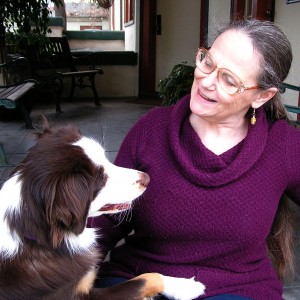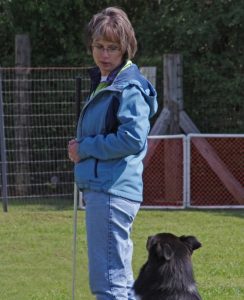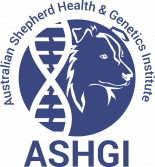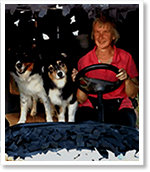The Australian Shepherd Health & Genetics Institute, Inc. (ASHGI), established in 2002, is a 501(c)(3) organization.
Our breed is one long praised for its versatility. We can boast in-the-trenches working and service dogs; top competitors in agility, conformation, obedience and stockdog trials; and beloved family companions. These many areas of activity involve people of differing backgrounds and goals, but canine hereditary disease is a reality for all of us.
Hereditary diseases are a growing breed issue. Without access to information about those diseases, breeders and owners cannot make informed decisions. Without research specific to Aussies, modes of inheritance will not be determined for our breed, nor will DNA screening tests be developed. Research requires both data and funding, both of which must largely come from people within the breed.
ASHGI is dedicated to the increase and diffusion of knowledge of genetics in the Australian Shepherd, and the inherited diseases from which it sometimes suffers. We envision serving all Aussies, no matter what their purpose, the goals of their owners, or where they live. ASHGI will work both independently and in cooperation with researchers, breed clubs, canine health organizations and foundations that provide grant funds for canine genetics research.
Our IRS not-for-profit status will allow a conduit by which interested individuals may be able to make deductible donations toward education and research on breed genetics issues. (Please check with your tax professional.)
We have created ashgi.org to provide information about ASHGI and Aussie genetics and offer links to other sites of interest.
ASHGI: Ten Years’ Progress for Aussie Health
First printed in the Winter 2012 Double Helix Network News; Rev. March 2013
Genetic science is in a period of rapid advance. DNA-based technologies are now common. From its Mendelian roots the science itself has sprouted many branches: Molecular, evolutionary, medical, forensic. Population genetics has assumed an important role in conservation biology, epidemiology, and plant and animal husbandry—including dog breeding.
This brave new world of DNA testing and dog cloning can be intimidating to dog breeders mentored by a tradition steeped in basic Mendelian genetics. Understanding inheritance and applying it to a breeding program has become much more complicated. Our old assumptions that there was a gene for every trait and inheritance is a simple matter of dominant or recessive have been superseded by recent discoveries focused on risk factors, developmental pathways, and gene regulation. Helping breeders and owners cope with the explosion of genetic knowledge is the major focus of the Australian Shepherd Health & Genetics Institute (ASHGI).
ASHGI has just completed its first decade of service to the Australian Shepherd community and is looking forward to the next one. Though a charity based and registered in the USA, ASHGI exists to serve all Australian Shepherds and their people no matter what the dogs’ purpose, the goals of their owners, or where they might live.
Focus on health
ASHGI has always recognized the importance of teaming with like-minded organizations for the benefit of the breed. Over the past decade, ASHGI has worked in cooperation with researchers, breed clubs, and granting agencies funding canine health research. Through these partnerships ASHGI has achieved important benefits for our breed, like inclusion in major cancer research.
ASHGI is also positioned to act independently where necessary. Given the worldwide distribution of the breed, multiple registries, and numerous and sometimes competing national clubs, health issues can wind up taking a back seat to other concerns and goals. However, every breed needs a group whose sole focus is breed health. Therefore, ASHGI’s founding board members, George Johnson, Peter Adolphson, and C.A. Sharp, felt an independent entity would best serve the needs of the breed.
ASHGI is incorporated in California as a not-for-profit and has the federal 501(c)(3) status necessary for people in the US to be able to take tax deductions for their donations. During the first few months of ASHGI’s existence its all-volunteer board worked on establishing the organization’s structure and goals, as well as solidifying its legal status. ASHGI was introduced to the Aussie community on July 22, 2002.
Keeping in touch
Getting the word out to the breed community and launching ASHGI’s educational efforts were job one for the new board. One of their first actions was to establish a website. The board realized a website would take time and money to develop, so they decided to offer anyone who gave $50 or more a donor premium of a subscription to the award-winning Aussie health newsletter, Double Helix Network News, a donor benefit which continued through 2013. ASHGI supporters received a special insert updating them on ASHGI events and accomplishments.
The ASHGI website went live in January 2003. Since that time it has become the primary health resource for Aussie owners and breeders. It has also generated interest from people and organizations serving other breeds. In 2007 the Purebred Alliance of Writers recognized the website with an Arthur F. Jones Award. The site offers numerous articles on pertinent topics, information about ASHGI’s various programs, and a page listing current research projects relating to Aussies.
The website’s success emphasizes the importance of communication. In 2010 ASHGI created a Facebook page. Facebook offers an excellent platform for distribution of updates or time-sensitive information and allows supporters an easy way to make comment or ask questions.
Simply presenting educational material isn’t enough. Inevitably, people will have questions or someone may be seeking information about a topic not covered on the website. To meet this need, ASHGI offers personalized health information through the “Ask the Expert” program. E-mail links are provided via the “Ask the Expert” logo on each of the website’s subject matter pages. The “Ask the Expert” volunteers all have long experience in the breed and expertise on one or more health and genetics topics.
Knowledge Is Key
A large part of ASHGI’s focus is on educating Aussie owners and breeders about health and genetics issues that impact the breed. In addition to the varied topics offered on the website, ASHGI has been at the forefront of emerging health issues, offering basic information, referencing resources, offering breeding advice, and actively keeping the breed community informed about advances and developments in health matters.
ASHGI offers educational speaking events for clubs. President, C.A. Sharp has for many years presented talks and seminars on canine health and genetics and in 2008 her speaking events became an ASHGI program. She has made presentations across the United States from Florida to Alaska, in Canada, and in Europe. Clubs interested in hosting an event can
Coat color is an ever-popular genetics subject in breeds like the Aussie that have multiple coat colors and patterns. In 2004, ASHGI provided a home for Lisa McDonald’s website “A Field Guide to Coloration of Australian Shepherds” when the popular color genetics site lost its original home due to high levels of response. These pages remain a major on-line coat color resource.
We also provide electronic versions of educational hand-outs that clubs or other groups can print and make available at their events. Interested groups should contact C.A.
Surveys
From inception, ASHGI has recognized the importance of breed health surveys in determining which diseases and defects occur in the breed and how common they are, as well as highlighting the interests and concerns of owners and breeders. In 2009-10 ASHGI conducted the “Comprehensive Australian Shepherd Breed Health Survey,” the first survey in a decade to take a broad approach to breed health. It collected detailed health data on 612 Aussies born between 1990 and 2005 from 17 countries, almost twice the number collected in the most successful prior general survey. In a rare show of inter-club cooperation, the committee included representatives of both ASCA and USASA. The survey results are helping ASHGI focus its educational efforts. Portions will be provided to qualified researchers on request. A copy of the summary data is available to national breed clubs. (Those interested should contact C.A)
From the beginning ASHGI recognized cancer as a growing problem in the breed, but there was no information on which cancers were most frequent in Aussies or whether any showed familial patterns which would indicate an inherited predisposition. In 2006 ASHGI launched its “Australian Shepherd Cancer Survey” and collected detailed questionnaires on 534 Aussies with cancer. The most pertinent outcome was the finding that over 43% had one of two cancers: Hemangiosarcoma (26.4%) and lymphoma (16.8%.) In addition, a number of dogs for whom no specific diagnosis was given had cancer in the liver, lungs, or spleen, which are common sites for hemangiosarcoma. Review of the pedigree data collected indicated that both these cancers not only run in families, but frequently a single family will have multiple cases of both.
The survey ultimately lead to ASHGI being one of four breed organizations invited to send a representatives to a 2008 canine cancer research conference. At that event board member Kim Monti gave a presentation on ASHGI, its survey, and it’s active support of canine cancer research.
Research
Since 2003 ASHGI has actively supported research on breed health issues through promotion, logistical assistance and, as of 2012, over $152,000 in financial support. Because ASHGI lacks the staff or expertise to monitor grant compliance, it partners with two well-established granting agencies, the Morris Animal Foundation (MAF) and the AKC Canine Health Foundation (CHF.) ASHGI has also supported an epilepsy grant made by Toby’s Foundation.
One of the two most important research topics is cancer. Demonstrating that health surveys can have a very real pay-off, the strength of ASHGI’s cancer survey data enabled ASHGI to attract the interest of top canine cancer researcher Matthew Breen of North Carolina State University, who agreed to include Aussies in his own work as well as collect and archive Aussie samples to share with other researchers. ASHGI has collected dozens of samples from cancer dogs and their relatives for Breen’s sample repository. Through 2012, ASHGI has provided in excess of $77,000 to hemangiosarcoma and lymphoma research through CHF and MAF.
At the time ASHGI was founded, epilepsy was the number one health issue for the breed community. For many years there was no grant for Aussie-specific epilepsy research so the organization collected funds awaiting the day when an appropriate grant became available. That finally happened in 2009, when Ned Patterson of the University of Minnesota agreed to include Aussies in his extant canine epilepsy study. Since that time ASHGI has given more than $72,000 to grants supporting Dr. Patterson’s work, as well as that of his Finnish collaborator, Hannes Lohi of the University of Helsinki, largely in partnership with CHF but also with Toby’s Foundation.
ASHGI has also collected samples for Dr. Patterson’s research and encouraged owner participation in sample-gathering for both Patterson in the US and Lohi in Europe.
Cataracts are the breed’s most common eye disease. ASHGI has supported an MAF grant to the Animal Health Trust in the United Kingdom for continued research on Aussie cataracts. During the first phase of that work, which led to the HSF4 DNA test, it also provided logistical support, distributing forms and cheek swabs to nearly 200 dog owners.
In addition to these, ASHGI has provided publicity or logistical support for research projects focusing on behavioral genetics, hypothyroidism, MDR1, cleft palate, urinary tract diseases, exercise-induced collapse, developmental genetics, and coat color.
Conferences provide superb networking opportunities with researchers as well as ASHGI’s peer organizations from other breeds. In addition to the cancer conference mentioned above, ASHGI is regularly represented at CHF’s biannual conference. It was at a CHF conference that ASHGI board member Kim Monti connected with Dr. Breen. President C.A. Sharp has twice attended the International Canine/Feline Geonomics Conference, a biannual event held in the US every four years. This conference features presentations and posters on current cutting-edge research covering the gamut of canine and feline genetics studies.
While not a research effort, the Orthopedic Foundation For Animals’ Canine Health Information Center (CHIC) DNA Repository is an all-breed long-term DNA sample storage program that provides samples to qualified researchers. From the program’s inception, ASHGI has encouraged participation and actively collected samples for CHIC.
Ethical Issues
No matter how much research is done or information is available, it will have little impact if the breed community is not health-focused. ASHGI is deeply committed to encouraging the highest standards of breeder ethics as related to health. Toward this end, in 2004 ASHGI adopted a grassroots-created program, “Ten Steps to a Healthier Australian Shepherd” which arose from an intense ethics discussion on the EpiGenes list. The steps were designed to be applicable to any Aussie breeder, anywhere. The program has drawn interest not only within the breed, but from people in other dog breeds and even other species. A poster featuring the program won a prize in the “Health Policies and Priorities” category at the 2007 CHF conference. Almost 150 people have signed on to the Ten Steps program as of this writing.
In connection with Ten Steps, ASHGI has developed a recommended health testing and screening protocol, which is updated as new screening tests become available. The organization encourages “open” listing to those using OFA’s health screening programs and urges participation in CHIC’s open health database.
At this writing ASHGI is in the process of developing an Aussie-specific on-line open health resource where records on a variety of breed issues can be made available to anyone who wants to research pedigrees. Data will be drawn from existing open health registries, kennel and breed club publications, and from voluntary submissions of health documents made by dog owners.
IDASH
The open health database will become part of a program called the International Directory for Australian Shepherd Health (IDASH.) IDASH was initiated in 2007 when ASHGI incorporated the private pedigree analysis service C.A. Sharp had conducted for over a decade. Thanks to an extremely generous anonymous donor, a programmer is being hired to automate and web-mount this service and the open health database. Once the project is complete it will enable ASHGI to provide pedigree analysis results more quickly and efficiently and accommodate a much larger number of clients.
ASHGI has compiled data on thousands of dogs and a variety of diseases as well as faults like disqualifying coat colors, bad bites, and missing teeth. This data, provided directly by owners and breeders or extracted from open health databases provides background information for ASHGI’s pedigree analysis and genetic counseling services. It also enables analysis of health trends, and helps focus ASHGI’s research support efforts. The only specifics shared with clients are those drawn from public access sources.
World View
The word “international” in the name of IDASH is not coincidental nor is it there just to sound good. The idea for IDASH was initially developed by former ASHGI board member Kylie Munyard PhD, a geneticist in Australia. The organization is very aware that the Australian Shepherd is multi-faceted and has earned international appreciation. Genetic issues are rarely confined to a single line of dogs. They affect showdogs, stockdogs and performance dogs. Nor do they occur only in one region of the world.
ASHGI makes every effort open its programs to breeders and owners of Aussies everywhere. In addition to ASHGI staff and representatives from ASCA and USASA, the recent health survey’s committee included a representative of the ASC Netherlands, an FCI club. ASHGI does not confine its support to US researchers, having assisted studies in Canada, Europe and Australia. Wherever discoveries are made, they can benefit the breed. Whenever available, translations of articles on the website are posted to make those articles accessible to non-English speakers. ASHGI encourages magazine and newsletter editors in non-English-speaking countries to make translations of its articles for the benefit of their readers.
People Power
ASHGI is an all-volunteer organization, from people who work a single shift at an event booth on up to members of the board. This keeps operating overhead low so almost all the money received from donors goes to research and programs. ASHGI has a handful of regular volunteers (see text box) who see to the organization’s ongoing activities and are vital to ASHGI’s accomplishments. President Sharp said, “We are extremely grateful for the many people who volunteer their time and effort, whether for a few hours or all year ‘round. We couldn’t do it without you.”
ASHGI is always seeking dedicated volunteers. If you have expertise you think could be helpful to operation or programs or you are willing to be on an on-call list for short-term needs like booth help, please let us know: 2_bill@ashgi.org.
Since the fall of 2004, ASHGI has had a booth at the ASCA National Specialty. From 2005 to 2009 it also had one at the USASA nationals. These are very important breed events, and ASHGI would like to have a presence at all of them. Unfortunately, they have not been able to do so recently at USASA’s nationals due to lack of volunteers. (Anyone who would like to help is encouraged to come forward.)
Depending on the event and volunteer availability, ASHGI’s booths offer health information, DNA screening tests, research sample collection, and fundraising raffles.
$$$$$$$$$
While ASHGI’s operations are streamlined to minimize operational expense, the organization does need money to meet its goals. Individual donations made without restriction and the income from the IDASH Pedigree Analysis service cover the organization’s basic operating costs and program support.
The largest area of expenditure is in support of breed health research. The annual raffle at the ASCA National Specialty brings in the lion’s share of those funds. ASHGI held modest raffles for several years but in 2001 breeder Cherrie Cannon lost her dog Jax to cancer and offered to chair a raffle specifically to raise funds for cancer research. Cherrie has continued promoting the raffle, with over $65 thousand raised for cancer and epilepsy research through 2012.
ASHGI has also been the beneficiary of fundraisers organized by a number of regional breed clubs as well as numerous individual donations.
We are extremely grateful for the support we have received over the years from clubs and individuals who have donated money, goods, and services to ASHGI. Without these gifts, ASHGI couldn’t support research and would be very limited in the services offered.
Saving the past for the future
ASHGI maintains an archive of material related to Australian Shepherd health and genetic topics. In addition to the organization’s own records, it includes the dog-related personal papers of C.A. Sharp and those of Betty Nelson, who was the first individual in the breed to pursue a long-term active interest in Aussie genetics and served as a mentor to Sharp. ASHGI hopes that this material can be preserved for the benefit of Aussie breeders and owners for generations to come.
ASHGI looks forward to its next decade and beyond. Thus far, it has contributed in various ways to important advances in epilepsy research, increased research focus on cancer in the breed, and assisted with the discovery of a mutation that leads to cataracts, as well as providing a wealth of information and services related to breed health. With the continued support of the world-wide Australian Shepherd community it will keep doing all of this and more.
President: C.A. Sharp

C.A. Sharp is a science writer and an internationally recognized lay expert on canine genetics and hereditary diseases. She is journal published (“Collie Eye Anomaly in Australian Shepherd Dogs” Rubin, Nelson and Sharp, Progress In Veterinary & Comparative Ophthalmology, 1991, 1(2):105-8 and “KITLG maps to canine chromosome 15 and is excluded as a candidate gene for merle in dogs, ” Schmutz, Berryere and Sharp, Animal Genetics, 2003 Feb;34(1):75-6.) and also co-author of a July 2018 conference poster presentation (A Survey of Australian Shepherd Breeding Practices and Genetic Diversity” Bennet-Wimbush, Suagee-Bedore, and Sharp). Most of her published work has consisted of genetics and hereditary disease articles for dog breeders and owners. From 1993-2014 she published the award-winning Double Helix Network News. She received the AKC Canine Health Foundation’s Golden Paw Award for her article “The Rising Storm.” Her writings and DHNN earned four Dog Writers’ Association of America “Maxwell” awards, including one for “The Price of Popularity,” on the impact of popular sires on breed population genetics. Her articles for lay readers have been published, reprinted, or translated in a wide variety of dog magazines, websites and newsletters the world.
Sharp has been in dogs, specifically the Australian Shepherd, since the early 1970s, breeding and showing through the early 90s. She has been a member of the Australian Shepherd Club of America since 1976 and the United States Australian Shepherd Association since 2005. ASCA presented her with its Lifetime Achievement Award in 2007. In 2001 she and others formed the Australian Shepherd Health & Genetics Institute, a state (California) and federally registered not-for-profit corporation. ASHGI exists to provide breed health related education and services to owners and breeders as well as to promote research on Australian Shepherd health issues and breed genetics. She also conducts seminars for dog clubs in the US and Europe.
From the mid-1980s Sharp has collected data on hereditary disease in Australian Shepherds, data which is now part of ASHGI’s International Directory for Australian Shepherd Health (IDASH). She has used this information to assist researchers as well as to provide informal genetic counseling and pedigree analysis for breeders and owners, first independently and later for ASHGI.
Sharp has frequently assisted researchers in canine genetics on projects ranging from coat color to ophthalmology to longevity. Her efforts include spreading the word about the projects, educating people about the subject of the research, and facilitating data collection. ASHGI has, to-date, provided over $100,000 in grant support through Morris Animal Foundation and the AKC Canine Health Foundation.
Treasurer: Laura Cullins
ASHGI Treasurer Laura Cullins assumed her position after serving as the Ask-the-Expert volunteer for health issues and assisting at an ASHGI/ASCA DNA blood draw clinic. She retired in 2017 after 30 years as a veterinary technician/research specialist at North Carolina State University’s veterinary college. She currently works for a consulting firm which assists health care providers. She has a BS in Zoology and Animal Science.
Cullins is a member of the Australian Shepherd Club of America and First In Flight Australian Shepherd Club. She has had Aussies since 1985, competing in agility, obedience, rally, and barn hunts. Her dogs also accompany her when she’s hiking or trail riding. She currently has an Aussie and, an Aussie/Border Collie mix. Cullins is also a horsewoman, riding for pleasure and competing in endurance events. In the past she competed in open horse shows and eventing.
Cullins enjoys outdoor activities with her dogs and horses. She resides in North Carolina with her husband, Chester.
Secretary: Kristie Klein
 Kristie Klein started in dogs as a junior handler of German Shepherd Dogs. She purchased her first Aussie while in graduate school in the early 1990’s. In the years since then, she has competed in many venues of several registries, including conformation, agility, rally, herding, obedience and barn hunt. She is a member of USASA, ASCA and founding member and trial secretary for First in Flight ASC. Kristie also served as secretary and east coast coordinator/representative for Second Time Around Aussie Rescue (STAAR).
Kristie Klein started in dogs as a junior handler of German Shepherd Dogs. She purchased her first Aussie while in graduate school in the early 1990’s. In the years since then, she has competed in many venues of several registries, including conformation, agility, rally, herding, obedience and barn hunt. She is a member of USASA, ASCA and founding member and trial secretary for First in Flight ASC. Kristie also served as secretary and east coast coordinator/representative for Second Time Around Aussie Rescue (STAAR).
Kristie has a BS in Animal Science and an MS in Entomology from the University of Arkansas and currently works for an international stamp collecting business. She has been volunteering for ASHGI in the position of promotional/advertising.
She lives in Pittsboro North Carolina with husband Chuck, seven Aussies, sheep and ducks.

